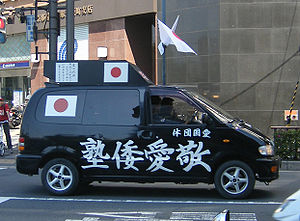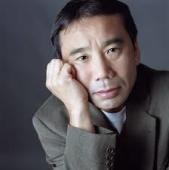Four recent articles have highlighted the growing danger of right-wing extremism in Japan.
First Murakami Haruki, Japan’s leading novelist, spoke out against the whitewashing of Japan’s record in WW2. “After the war, it was eventually concluded that no one was wrong,” said Murakami of the pervasive attitude in Japan. It is offensive to the millions who suffered untold cruelty at the hands of the Japanese army, and nationalists need to take on board that more Chinese died in WW2 than all the Americans, British and Japanese put together.
A second article by Hugh Cortazzi, former UK ambassador to Japan, stated: ‘It is very much in Japan’s national interest that the revisionists are discouraged from propagating their historical lies and that Japanese democratic processes are not threatened by extremist anti-democratic individuals or groups.’ As a supporter of Japan, Cortazzi ends his forceful piece with, ‘Better a candid friend than an insincere sycophant.’ Hear, hear! (For the full article, click this link.)
A third article by Japanese professor, Yamaguchi Jiro, further highlights the extreme rightwing orientation of the Japanese government. While campaigning to win respect abroad, it pursues repressive politics at home and condones ties to neo-Nazis. The media have been effectively silenced, textbooks are being rewritten to omit mention of atrocities, and the head of the national broadcaster NHK has more or less declared that it operates as an arm of the government. (Click to see The article in the Japan Times .)
Fourthly, there was a stinging condemnation of extremist elements by Jeff Kingston, director of Asian Studies at Temple University, entitled ‘Right-wing witch hunt signals dark days in Japan’ (click here). “The revisionist right in Japan with the active encouragement, if not involvement, of the Abe government has succeeded in controlling NHK news, intimidating Asahi Shimbun and now academia,” says Koichi Nakano, a professor of political science at Sophia University.

A far right van in Kyoto bearing the slogan Respect the Ancient Japan School (wikicommons)
Intimidation of those who speak out against prime ministerial visits to Yasukuni is part of the extreme right’s campaign of vilification. “In 2006, Koichi Kato, a moderate (Liberal Democratic Party) politician, had his house in Yamagata burned down for his criticism of Prime Minister (Junichiro) Koizumi’s visits to Yasukuni Shrine.”
Things have grown so bad now that some commentators are likening the situation to the 1930s. “In recent years, pressure by right-wing groups has led to cinemas canceling movies dealing with sensitive war-related issues; hotels canceling the reservations of conference rooms for symposia dealing with such issues; and museums canceling or revising exhibitions with sensitive contents. (There has been) widespread anti-China and anti-Korea sentiments (and) books of that kind becoming best-sellers, hate demonstrations, assaults on history by the nation’s leaders that trickle down to the general public, page-ripping of Anne Frank’s diaries, hiding of ‘Barefoot Gen’ in school libraries, assaults on protest tents in Okinawa and anti-nuclear tents in Tokyo, and public places refusing to rent space to groups that discuss issues like the Constitution and anti-nuclear power.”
There are times in history when it’s important to stand up and speak out. Conservative collaborators in the West, including sympathisers with Shinto, like to turn a blind eye to political developments such as visits to Yasukuni. In so doing they are guilty of complicity, for the stink of collaboration with racist thugs like the Zaitokukai* hangs over them. As Yamaguchi points out in his article, ‘It is the job of members of the media and academics to tell people immersed in narcissism that they, in fact, have ugly aspects.’ So let it be clearly stated: those who exploit Shinto for extremist ends are ugly indeed!
* To learn about Zaitokukai, see here.
******************************************************
Author Murakami chides Japan over WWII, Fukushima responsibility
NATIONAL NOV. 04, 2014 Japan Today

Murakami Haruki (source unknown)
Speaking to the Mainichi Shimbun newspaper, the 65-year-old author said: “No one has taken real responsibility for the 1945 war end or the 2011 Fukushima Daiichi nuclear accident. I feel so.”
“After the war, it was eventually concluded that no one was wrong,” said Murakami of the pervasive attitude in Japan. Japanese people have come to consider themselves as “victims” of the war, he added.
Murakami, one of Japan’s best known writers who has repeatedly been tipped as a future Nobel Literature laureate, said that it was natural for China and the Koreas to continue to feel resentment towards Japan for its wartime aggressions. “Fundamentally, Japanese people tend not to have an idea that they were also assailants, and the tendency is getting clearer,” he said.
Japan’s lack of repentance over its in the first half of the 20th century continues to strain relations with regional neighbors.
**************************************************************************************
For a suppressed 2-hour documentary on WW2 by Kazuo Hara, The Emperor’s Naked Army Marches On (Yukiyukite shingun, 1987), see
https://www.youtube.com/watch?v=FDkrunQwoLc. You can switch on subtitles at the bottom.


Thank you for writing about this difficult topic, John. I was just alerted by Claude in Wyoming, who is keen on Japanese culture and following your blog. He strikes me as at least part Native American.
I’ve been aware of the lurch to the right, especially with the state secrets act, which I consider extremely worrisome. Living out in the boondocks, I don’t see a lot of what is going on. I and my husband moved away from Tokyo for several reasons, but one is that I knew these days were coming, when global resources would start to deplete. The right wing becomes ascendant at such times, for reasons of broad social dynamics. (This is happening everywhere right now. And if you have not seen John Michael Greer’s articles, hop over to the Arch Druid Report. he is very insightful and knowledgeable about history.)
I’ll share what I wrote back to Claude, as it might be of interest here. The topic is apt to become more pressing as time goes on:
“Claude, I tend to feel like a guest in Shinto. Mostly, it is my place to
listen, and not give my own opinion. To raise my voice about Yasukuni would
be an unwelcome political act. I would not be able to sway anyone, anyway.
Any living religion will have a right wing presence of some sort. In the
religions that eschew violence, they cause no real problems. They are a
potential problem in Shinto.
“There is a strong right-wing presence in Shinto, but they mostly refuse to
associate with me. I have been bullied by one lady who calls me “impure.”
She bullies everyone, though.
“My approach, attempting to be harmonious with all participants in Shinto, is
to observe uncritically, but there are certain lines which if the right wing
crosses, I will stop associating with whatever sector or clique is engaged in
the activities, and make no secret of distancing from them.
“There are certainly right wing cliques engaged in petty hateful actions, but
nothing big yet. I associate with none of them, but at the Kompira Shrine
there are some conservative priests and teachers, and I listen politely to
their opinions.
“Thank you for asking!”
Pat
Pat, I think your comment is really astute. Of course you are right that any living religion will have a right wing, as well as a left wing. And a far right wing and far left wing to go along with them. The same goes for politics, or just about anything made up of a lot of human beings, for that matter.
Your strategy is a good one, think. It’s worth remembering that liberation and conservation are both fundamental human urges, both of which are necessary for individual and societal health. A right wing is perfectly healthy, up to the kinds of limits you allude to. And as long as it is balanced by a healthy left wing. (Thank goodness Haruki Murakami is on the case!)
To anyone else reading, I double the recommendation to check out John Michael Greer. A very Shinto-harmonious writer.
http://thearchdruidreport.blogspot.com